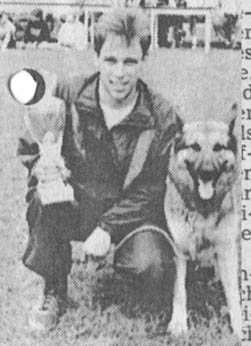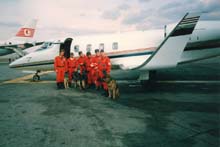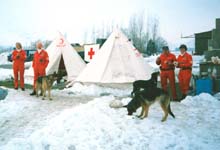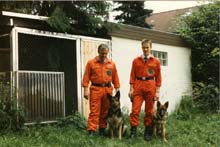After all, I view him as my "pal" and not just as a means to achieve sporting results like many others in this field unfortunately still do. After several weeks of reading through all kinds of training related materials, and after visiting a number of dog clubs here in the US and in Germany, it became clear to me that there was no "new standard" for training dogs. What I found however was a huge philosophical rift that had split a lot of dog trainers and handlers into two groups.
The first group still trains their dogs the "traditional way" - a way based on the common "jerk and pull" training methods that I was once taught as well more than 20 years ago. As for the second group, they no longer condone these methods which they consider mindless torture more than anything else. Their methods are primarily motivational: Teach your dog how to succeed instead of what happens if he fails. I always found it unethical when I saw other handlers resorting to prong collars just to teach their dog some basic obedience. These were the methods of the past, and there was no way that I would continue down this path in the future.
Andy's training program is completely based on "positively
reinforced operand conditioning", and our results are simply outstanding. That's what this website is all about. Whether you train your family pet, competitive Schutzhund or a rescue dog, this training method results in a happier and more confident dog with lots of motivation and drive. So does all of that make me an expert? Certainly not, but I wonder if there truly is one even though may claim to be one. All dogs are different and training methods change. That makes it important to keep an open mind - and to question methods that are recommended to you by the so-called experts if you think that these methods are not right for your dog.
One final note: When you first get here, there is a good chance that parts of this website are still incomplete. It was quite an effort to get the initial version up and running, and now it is all about adding content. I will do that whenever I have time so check back often. If there is something you are looking for that I don't cover today - perhaps it will be there next week. If you have any content suggestions contact me at info[at]yousmartdog.com and let me know!
Thanks for visiting!
Steve
Note on website conventions:
For us here at YouSmartDog, our dogs are family and we don't refer to members of our family as "it". For that reason, we refer to our dogs as "he" or "him" throughout this website, primarily because Steve's dog is male. This does not mean that the information contained herein is not applicable to female dogs nor do we intent to discriminate in any way. Simply put, we felt it is more convenient for a reader to read about "him" in our writings than about "him/her" just for the sake of correctness.
About Steve:
Steve grew up near the city of Hamburg in northern Germany
where he was actively involved in training dogs since his
early teenage years. Steve joined the SV (Germany's shepherd
club) OG Blankeneese at the age of 15 to help his father train
his female German shepherd dog. Steve started to handle his
first own dog at the age of 16 and at the age of 17, he became
helper at the OG Appen Etz (LG1) Schutzhund club where he worked
with dogs that competed at the highest national level (Bundessiegerpruefung).
| |
 |
In 1986, Steve joined the German Red Cross rescue dog team
in the city of Hamburg, one of Germany's first and most reputable
rescue dog teams at that time. During his tenure at this organization,
Steve has trained and handled several different dogs in trailing,
area search and disaster search. Steve and his dogs have been
deployed in countless search and rescue mission ranging from
missing person searches in the wilderness to urban disaster
searches (i.e. after gas explosions). Steve was selected twice
to serve in international red cross rapid response missions
after the major earth quakes in Armenia (former USSR) and
eastern Turkey. He eventually received the second highest
recognition awarded by the International Red Cross for outstanding
services.
  
Steve moved to the United States in 1997 where he is currently the President of a Silicon Valley software start-up. Steve is working with dogs again. His particular interest is compulsion free Schutzhund training - a training style completely based on positively reinforced operand conditioning. His German Shepherd Dog "Andy" loves it!
|